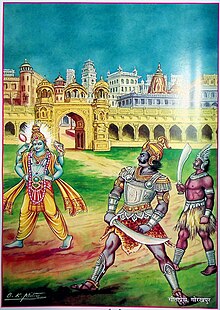fiction.wikisort.org - Character
Kalayavana (Sanskrit: कालयवन, lit. death amongst descendants of Turvasu) is a king in Hindu tradition. He is stated to have invaded Mathura with an army of 30 million yavanas (barbarians) against Krishna.[2][3]
| Kalayavana | |
|---|---|
 Kalayavana and Krishna | |
| Information | |
| Dynasty | Yavana |
| Father | Gargya[1] |
| Mother | Ramba |
Legend

According to the Vishnu Purana and Harivamsa, Kalayavana was a yavana king. He was the partial incarnation of Krodha.[4][5]
Jarasandha, Kansa's father-in-law, and the ruler of Magadha attacks Mathura seventeen times, but is beaten by Krishna every time. Jarasandha unable to defeat Krishna on his own made an alliance with Kalayavana. Kalayavana is a powerful yavana warrior who had gotten a boon from Shiva that on the battlefield, he would be undefeatable.[6]
Krishna, in order to defend his people, built a new strong and glorious city, named Dvaraka, to which he transported the inhabitants of Mathura.[7] Kalayavana attacked Mathurā with an army of 30 million yavanas. Krishna, realising that the yavanas have greatly outnumbered all the Yādavas, decided to challenge Kalayavana for a duel. Krishna strategically fled the battlefield. Krishna lured Kalayavana into the cave where the great king of Treta Yuga, Muchukunda, one of the forefathers of Rāma, was in a deep slumber of thousands of years after helping devas in an epic war with asuras.[8]
Contemplating an absolutely undisturbed sleep he was given a boon by Indra that anyone who dared to disturb his sleep would get burnt to ashes immediately.[6] In the Dvapara Yuga, in the darkness deep inside the cave, Krishna covered Muchukunda with his shawl. Kalayavana, assuming him to be Krishna kicked him, thus disturbing his sleep and burning into ashes. Muchukunda was delighted to see Krishna there. Krishna advises him to perform tapasya to cleanse the accumulated sins to attain moksha. After meeting with the lord, Muchukunda sets out of the cave. Muchukunda then goes north to Gandamadana Mountain, and from there to Badrikashrama for doing penance and finally achieves liberation, the moksha.[9][10]
In popular culture
The hills and the cave where Muchukunda rested is held by locals to be located at Ranchodji teerth, district Lalitpur, in the state of Uttar Pradesh.[11]
References
- "Story of Krishna and Kalayavana - Part 1". Retrieved 11 November 2012.
- Nivedita, Sister (2001). Myths and legends of the Hindus and Buddhists. Ananda K. Coomaraswamy (1st Indian ed.). Kolkata [India]: Advaita Ashrama, Publication Dept. ISBN 81-7505-197-3. OCLC 53466600.
- Dowson, John (2000). A Classical Dictionary of Hindu Mythology and Religion, Geography, History and Literature. Psychology Press. ISBN 978-0-415-24521-0.
- Dutt, Manmatha Nath, ed. (1897). A Prose English Translation Of Harivamsha.
- www.wisdomlib.org (30 August 2014). "Burning of Yavana king, Kalayavana and praise of Mucukunda to Kansa [Chapter XXIII]". www.wisdomlib.org. Retrieved 10 December 2021.
- "HARIVAMSHAM (GEETA PRESS)". mahabharata-resources.org.
- "THE KRISHNA AVATĀRA". sacred-texts.com.
- "A Hindu King who Slept for Almost 4 Million Years!". HariBhakt | History, Facts, Awareness of Hinduism. 24 August 2015. Retrieved 10 December 2021.
- "Muchukunda". www.mythfolklore.net. Retrieved 10 December 2021.
- "Mytholgical Story : Krishna and Muchkunda". www.kidsgen.com. Retrieved 10 December 2021.
- "Muchkund Cave | District Lalitpur, Government of Uttar Pradesh | India". Retrieved 10 December 2021.
Другой контент может иметь иную лицензию. Перед использованием материалов сайта WikiSort.org внимательно изучите правила лицензирования конкретных элементов наполнения сайта.
WikiSort.org - проект по пересортировке и дополнению контента Википедии
